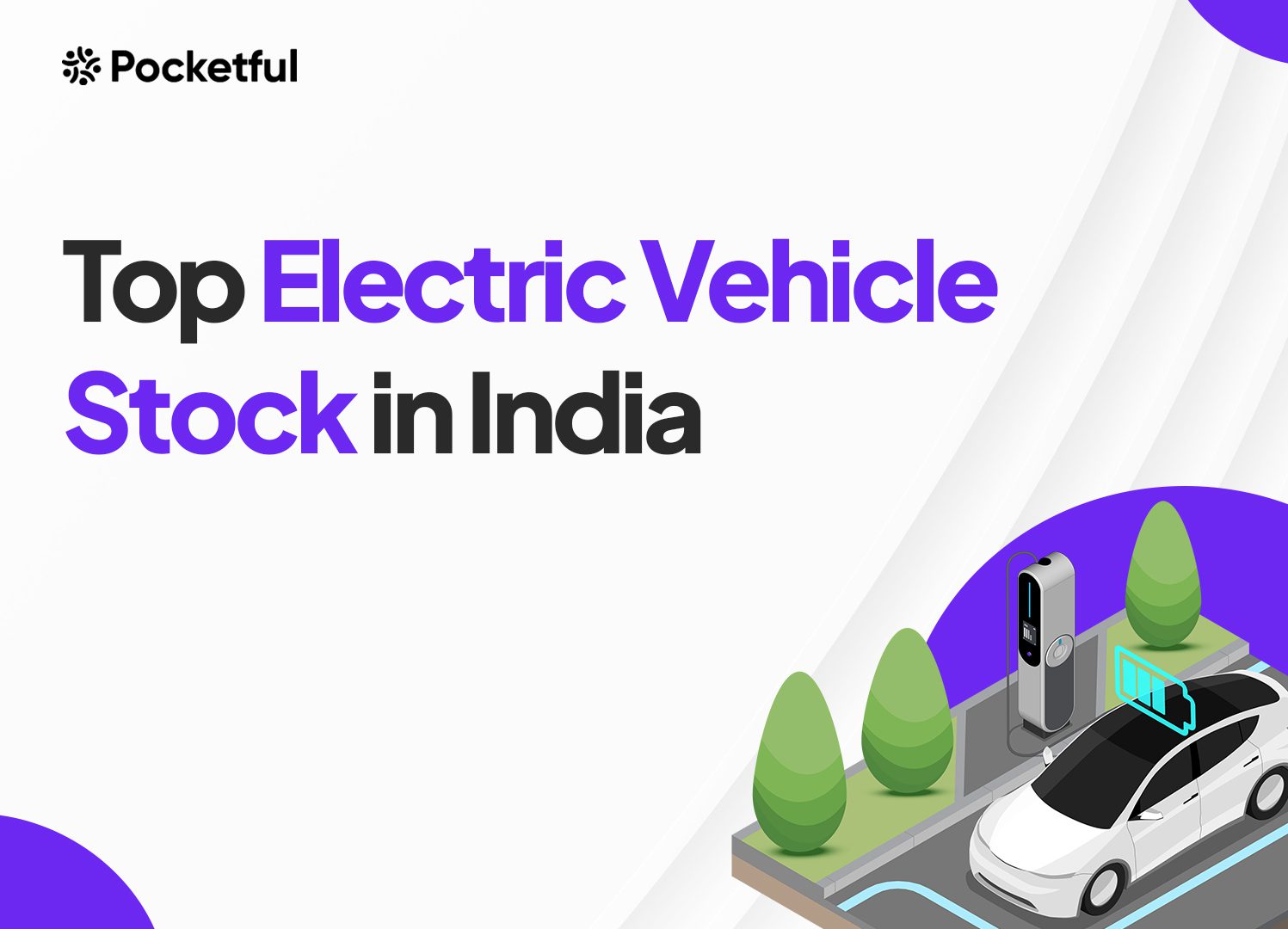| Type | Description | Contributor | Date |
|---|---|---|---|
| Post created | Pocketful Team | Jul-31-24 |

- Blog
- best electric vehicle stocks in india
List of Best Electric Vehicle Stocks in India 2025

When you realize that the fuel gauge on your four-wheel drive vehicle is indicating low, you have to stop at a gas station to fill it out. But what if we told you that other kinds of cars don’t run on conventional fuels like petrol and diesel? Yes, you read it correctly: vehicles in the future will run on batteries that you can charge at home.
In this blog, we will explore companies involved in the Electric Vehicles sector and highlight some promising EV stocks India investors should consider.
Overview of the Electric Vehicle Industry

In 2023, India overtook Japan to become the third-largest auto market. The Indian government is pushing for the adoption of electric vehicles (EVs) to mitigate pollution and enhance air quality in light of growing environmental concerns. Investors are closely monitoring the companies that produce electric vehicles and their spare parts due to the increase in demand for these vehicles.
Top Electric Vehicle Stocks Based on Market Capitalization
The top Electric Vehicle stocks in 2025 are:
| S.No. | Electric Vehicle Stocks |
|---|---|
| 1 | Tata Motors |
| 2 | Mahindra and Mahindra Limited |
| 3 | Bajaj Auto Limited |
| 4 | Hero Moto Corp Limited |
| 5 | Exide Industries Limited |
EV stocks have been listed in descending order based on their market capitalization in the table below:
| Company | Market Capitalization (In crores) | Share Prices (In INR) | 52 Week High Price | 52-Week Low Price |
|---|---|---|---|---|
| Tata Motors Limited | 4,10,621 | 1,118 | 1,120 | 593 |
| Mahindra and Mahindra Limited | 3,59,106 | 2,888 | 3,014 | 1,416 |
| Bajaj Auto Limited | 2,65,023 | 9,493 | 10,039 | 4,541 |
| Hero MotoCorp Limited | 1,09,540 | 5,479 | 5,895 | 2,889 |
| Exide Industries Limited | 47,069 | 554 | 620 | 242 |
Read Also: 10 Best Small Cap Electric Vehicle Stocks
Best EV Stocks in India 2025 – An Overview
The best EV stocks in India are given below, along with a brief overview:
1. Tata Motors Limited
When Tata Motors Limited was first established in 1945, it was known as the Tata Engineering and Locomotive Company, or TELCO for short. The business started making trucks after forming a joint venture with the German corporation Daimler Benz. When the company entered the passenger car market in 1991, it produced the Tata Sierra, its first four-wheeler. The company’s 2008 acquisition of Jaguar Land Rover, a British premium car manufacturer, was a wise strategic move. With the launch of Tata Nexon EV, the company has made a name for itself in the EV market.
2. Mahindra and Mahindra Limited
The Mahindra and Mohammed firm was founded in 1945 by Malik Ghulam Muhammad and the Mahindra brothers. The business was first involved in the trading of steel. Obtaining the license to assemble Willy Jeep allowed the company to enter the automobile sector in 1947. The business was then listed on the Bombay Stock Exchange in 1956. Mahindra Reva was the company’s first electric car. The company’s headquarters is located in Mumbai.
3. Bajaj Auto Limited
Founded in 1945, the company participates in the two- and three-wheeler market. The business was first known as M/s Bachraj Trading Corporation Private Limited and initially imported and sold vehicles. It started manufacturing and selling two-wheelers and three-wheelers in the country in 1959 and later became a publicly limited business in 1960. This company is the second-biggest motorcycle producer in India and the third-largest motorcycle manufacturer globally. It also holds the record for producing the most three-wheelers globally. Bajaj launched Chetak, its first electric scooter, in 2020 and aims to build an EV production facility with a capacity to manufacture 5,00,000 electric vehicles annually.
4. Hero Moto Corp Limited
Hero Moto Corp Limited was founded in 1984 as Hero Honda, a joint venture between the Honda Motor Company and Hero Cycle. This joint venture ended in 2011, and the business was renamed Hero Moto Corp Limited. The business rose to prominence in 2001 as the biggest two-wheeler producer globally in terms of calendar year sales. Hero AXHLE-20, its first electric scooter, was launched in the auto expo of 2018. The corporation is concentrating more on the electric vehicle market by developing its technology.
5. Exide Industries Limited
The company was founded in 1947 as a Chloride Electrical Storage Company UK (CESCO) subsidiary in India. The business renamed itself Chloride India Limited later in 1972. In 1988, Chloride India Limited was renamed Chloride Industries Ltd. before finally changing its name to Exide Industries Ltd. in 1995. The company specializes primarily in energy storage systems and lithium-ion battery technologies. The company’s head office is located in Kolkata.
Top EV Stocks Based on 1-Year Return
The top Electric Vehicle stocks in 2025 are:
| S.No. | Electric Vehicle Stocks |
|---|---|
| 1 | Himadri Speciality Chemical Limited |
| 2 | Hindustan Copper Limited |
| 3 | Amara Raja Energy & Mobility Limited |
| 4 | Exide Industries Limited |
| 5 | Mahindra and Mahindra Limited |
Performance of Electric Vehicle Stocks
| Company | 1-Year Return |
|---|---|
| Himadri Speciality Chemical Limited | 207.23% |
| Amara Raja Energy & Mobility Limited | 165.89% |
| Hindustan Copper Limited | 146.58 % |
| Exide Industries Limited | 116.62 % |
| Mahindra and Mahindra Limited | 99.10 % |
Best Electric Vehicle Stocks in India Based on 1-Year Return – An Overview
The best Electric Vehicle stocks according to 1-year return are given below, along with a brief overview of the services they provide:
1. Himadri Speciality Chemical Limited
When the business was first founded in 1987, it was known as Himadri Casting Private Limited. When the company was founded, its main line of business was coal tar pitch, soft pitch, and other related oils and catered to graphite and aluminum industries. The company changed its name to Himadri Speciality Chemical Limited in 2018.
2. Hindustan Copper Limited (Hind Copper)
Hindustan Copper Limited was established by the Government of India in 1967. It is the only company in India that mines copper ore and owns almost every copper mine in the country. In 2012, the company initiated its initial public offering (IPO) to raise capital for its expansion. The company produces copper, used in batteries and motors for electric cars.
3. Amara Raja Energy and Mobility Limited
In 1985, Dr. Ramachandra N. Galla established the company. The business produces batteries for the commercial and automotive sectors. In 1997, the company joined forces with the global manufacturer of automotive batteries, Johnson Controls Inc. The company is now working on creating better car batteries that use lithium and renewable energy storage technology.
An overview of the remaining companies is mentioned above.
Key Performance Indicators
| Company | ROE (%) | ROCE (%) | Debt to Equity | P/E | P/B |
|---|---|---|---|---|---|
| Tata Motors Limited | 36.97 | 19.39 | 1.16 | 11.84 | 1.3 |
| Mahindra and Mahindra Limited | 17.02 | 13.89 | 1.56 | 31.87 | 6.34 |
| Bajaj Auto Limited | 26.61 | 32.50 | 0.06 | 33.10 | 9.2 |
| Hero Motor Corporation Limited | 21.15 | 28.51 | 0.02 | 29.25 | 7.04 |
| Exide Industries Limited | 6.80 | 9.82 | 0.05 | 53.55 | 4.43 |
| Himadri Speciality Chemical Limited | 13.48 | 19.64 | 0.20 | 46.64 | 9.89 |
| Amara Raja Energy and Mobility Limited | 13.74 | 17.71 | 0.01 | 34.06 | 6.31 |
| Hindustan Copper Limited | 12.92 | 15.74 | 0.10 | 103.41 | 19.2 |
Read Also: List Of Best Battery Stocks in India 2025
Benefit of Investing in Electric Vehicle Stocks

Investment in EV Stocks can be a value addition to your portfolio because of the following reasons:
- Expanding Industry – Due to the growing demand for eco-friendly mobility, the demand for electric vehicles has grown. It is expected to continue rising at an accelerating rate in the future.
- Efficiency – Electric vehicles will soon overtake petrol and diesel automobiles in the market since they have lower operating costs.
- Government Incentives – The government offers several incentives to the EV industry, including the elimination of road tax for electric vehicles and further concessions for businesses that produce EVs.
- Diversification – Purchasing EV stocks will diversify your portfolio and lower your exposure to risk.
Factors to Consider Before Investing in Electric Vehicle Stocks
While the electric vehicle industry is anticipated to grow at a promising rate in the future, investing in this sector can be considered after taking into account the below-mentioned factors:
- Infrastructure – The market for electric vehicles may not be able to grow due to obsolete battery technology and inadequate charging infrastructure.
- Financial Health – This is regarded as the most crucial element before investing, and an investor must thoroughly analyze the companies.
- Regulatory Changes – The government supports the electric vehicle industry through several subsidies; changes to these incentives could impact EV manufacturers.
- Raw Material – Any disruption in the supply chain of important raw materials required for manufacturing batteries of cars, like lithium, copper, etc., could negatively impact the whole sector.
Future of the Electric Vehicle Sector in India
India’s electric car industry has a bright future because of government backing through various initiatives. The demand for electric vehicles (EVs) in India will rise due to consistently rising gasoline prices and increased disposable income among Indians. By 2030, the government aims for 30% of vehicles to be electric.
Read Also: List Of Best Ethanol Stocks in India 2025
Conclusion
In summary, the electric car industry has demonstrated progress in recent years and has enormous promise for the years to come. The electric car market is significant because countries are becoming more concerned about environmental issues. However, there are risks associated with investing in electric vehicle stocks, so an investor should speak with their financial advisor before making any investment decisions.
Frequently Asked Questions (FAQs)
Is it worth investing in Electric Vehicle stocks?
EV stocks present a fantastic investment opportunity as the world moves toward sustainable energy. However, investing in this industry carries several risks, so investors should carefully examine their risk tolerance.
How can government policies affect the performance of electric vehicle stocks?
The government is concentrating on encouraging the electric vehicle (EV) industry by offering various subsidies and developing favorable policies that can directly impact the industry’s growth and performance of EV stocks.
Should I diversify my portfolio by buying EV stocks?
You can diversify your portfolio by investing in electric car stocks, but only after considering your risk profile. Investing in various industries enables you to manage your risk appropriately.
Which companies are engaged in producing electric vehicles and components in India?
Various companies, such as Tata Motors Limited, Bajaj Auto Limited, Hero Moto Corp Limited, Mahindra and Mahindra Limited, Exide Industries Limited, etc., are engaged in the production and distribution of electric vehicles and their components.
Why are electric cars not popular in India?
The poor popularity of electric vehicles in India can be attributed to several factors, including high battery costs, restricted manufacture, a limited range in kilometers, and a shortage of charging facilities.
Disclaimer
The securities, funds, and strategies discussed in this blog are provided for informational purposes only. They do not represent endorsements or recommendations. Investors should conduct their own research and seek professional advice before making any investment decisions.